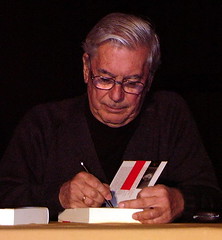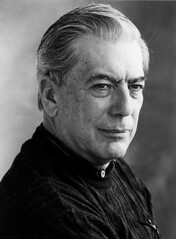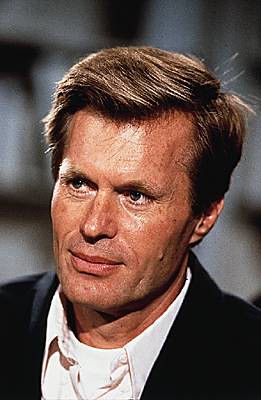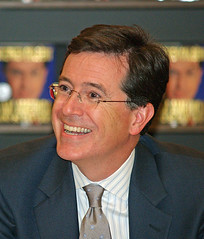
Марио Варгас Льоса
Я научился читать в пятилетнем возрасте — моим наставником был брат Юстиниан из школы де Ласаля в боливийском городе Кочабамба. И это самое важное, что случилось со мной в жизни. Сегодня, почти через семьдесят лет, я отлично помню то волшебство, с которым слова с книжных страниц превращались в образы, обогащая мою жизнь и ломая барьеры времени и пространства. Вместе с капитаном Немо я преодолел двадцать тысяч лье под водой, плечом к плечу с д’Артаньяном, Атосом, Портосом и Арамисом противостоял интриганам, замышлявшим недоброе против королевы во времена хитроумного Ришелье, перевоплотившись в Жана Вальжана, брел по парижским катакомбам с бесчувственным телом Мариуса на спине…
Чтение превратило мечты в жизнь, а жизнь в мечты: целая литературная вселенная оказалась на расстоянии вытянутой руки от мальчишки, которым я тогда был. Мать рассказывала, что первые мои «пробы пера» представляли собой продолжение прочитанных мною книг, потому что мне было жалко расставаться с героями или не нравилась концовка. Пожалуй, этим же, сам того не сознавая, я занимался всю жизнь: продолжал во времени — по мере взросления и старения — те истории, что наполнили мое детство восторгом и приключениями. Читать далее

 I learned to read at the age of five, in Brother Justiniano’s class at the De la Salle Academy in Cochabamba, Bolivia. It is the most important thing that has ever happened to me. Almost seventy years later I remember clearly how the magic of translating the words in books into images enriched my life, breaking the barriers of time and space and allowing me to travel with Captain Nemo twenty thousand leagues under the sea, fight with d’Artagnan, Athos, Portos, and Aramis against the intrigues threatening the Queen in the days of the secretive Richelieu, or stumble through the sewers of Paris, transformed into Jean Valjean carrying Marius’s inert body on my back.
I learned to read at the age of five, in Brother Justiniano’s class at the De la Salle Academy in Cochabamba, Bolivia. It is the most important thing that has ever happened to me. Almost seventy years later I remember clearly how the magic of translating the words in books into images enriched my life, breaking the barriers of time and space and allowing me to travel with Captain Nemo twenty thousand leagues under the sea, fight with d’Artagnan, Athos, Portos, and Aramis against the intrigues threatening the Queen in the days of the secretive Richelieu, or stumble through the sewers of Paris, transformed into Jean Valjean carrying Marius’s inert body on my back.
 My most sincere congratulations to all the graduates here. You made it through. You have a degree from a truly excellent institution. A lot of reading, writing, lying in bed (thinking, of course). And now you stand on one of life’s various summits. As you know, there’s only one way off a summit – but that’s another story. Don’t be taken in by those who tell you that life is short. It’s inordinately long. I was into my twenties when my mother astonished me by saying wistfully, ‘I’d give anything to be forty-five again.’ Forty-five sounded like old age to me then. Now I see what she meant. Most of you have more than 20 years before you peak. Barring all-out nuclear war or a catastrophic meteor collision, a substantial minority of you will get a toe in the door of the next century – a very wrinkled, arthritic toe, but the same toe you’re wearing now. You have a lot of years in the bank – but don’t worry, I’m not here to tell you how to spend them.
My most sincere congratulations to all the graduates here. You made it through. You have a degree from a truly excellent institution. A lot of reading, writing, lying in bed (thinking, of course). And now you stand on one of life’s various summits. As you know, there’s only one way off a summit – but that’s another story. Don’t be taken in by those who tell you that life is short. It’s inordinately long. I was into my twenties when my mother astonished me by saying wistfully, ‘I’d give anything to be forty-five again.’ Forty-five sounded like old age to me then. Now I see what she meant. Most of you have more than 20 years before you peak. Barring all-out nuclear war or a catastrophic meteor collision, a substantial minority of you will get a toe in the door of the next century – a very wrinkled, arthritic toe, but the same toe you’re wearing now. You have a lot of years in the bank – but don’t worry, I’m not here to tell you how to spend them. Good morning. Oh, what a day. What a lovely day. It’s a pleasure to be addressing the Wake Forest graduating Class of 2015. I want to start by thanking the administration and the Trustees for inviting me to speak. I want to thank them for giving me an honorary Doctorate of Humanities. I’m a huge fan of humans. And I have to thank them for this thing around my neck. There’s nothing you want on a chilly day like today than a nice scarf.
Good morning. Oh, what a day. What a lovely day. It’s a pleasure to be addressing the Wake Forest graduating Class of 2015. I want to start by thanking the administration and the Trustees for inviting me to speak. I want to thank them for giving me an honorary Doctorate of Humanities. I’m a huge fan of humans. And I have to thank them for this thing around my neck. There’s nothing you want on a chilly day like today than a nice scarf.